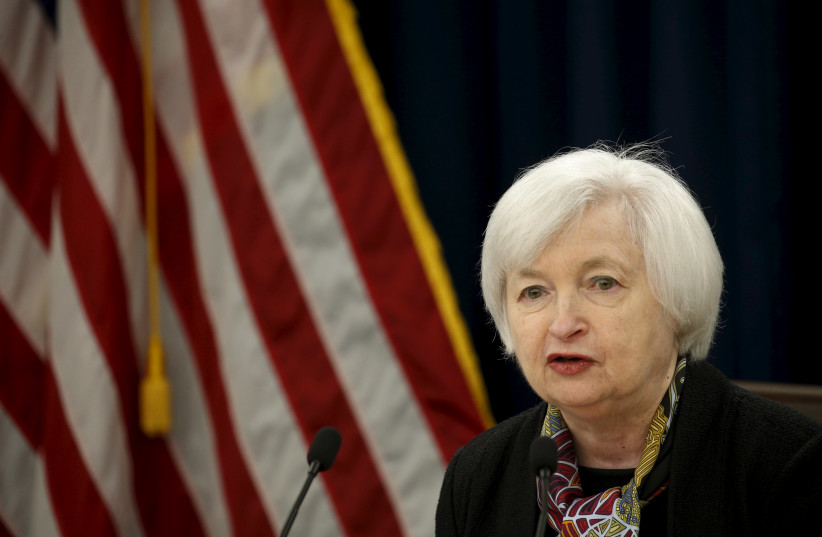The World Bank on Wednesday said it had stopped all programs in Russia and Belarus taking effect immediately, following the Russian invasion of Ukraine and "hostilities against the people of Ukraine."
In a statement, the multilateral development bank said it had not approved any new loans to or investments in Russia since 2014, the year it annexed the Crimea region of Ukraine.
The bank said it had not approved any new lending to Belarus since mid-2020, when the United States imposed sanctions on the country over a disputed presidential election.
In response, Russia's central bank imposed a 30% commission on foreign currency purchases by individuals on currency exchanges on Thursday morning, brokers citing a letter from the regulator told Reuters.
The Russian Rouble, Russia's state currency, has fallen to an all-time low of up to 0.0098 USD per rouble, making $1 USD equivalent to 102 rubles – a roughly 35% drop since the start of the conflict, as the country's financial system teetered under the weight of Western sanctions. Russia calls its actions in Ukraine a "special operation."
Later on Wednesday night, International Criminal Court prosecutor Karim Khan said he would immediately open an investigation into possible war crimes committed in Ukraine, following requests to do so by an unprecedented number of the court's member states.
"Active investigations formally commence in Ukraine upon receipt of referrals by 39 state parties," prosecutor Karim Khan tweeted. The referrals by member states fast-track an investigation as it allows the prosecutor to skip having to seek approval of the court in The Hague, shaving months off the process. The prosecutor had already said on Monday that he would seek court approval into allegations of war crimes in Ukraine.
The decisions by The World Bank and the ICC came as the US issued further sanctions against Russia on Wednesday, continuing to crack down on Putin's "war chest" of oil, gas and energy operations and isolate the country on the global stage. Sanctions include preventing the diversion of technological resources to Russia through Belarus; further sanctions against Russia's defense sector; control of the export of oil and gas extraction equipment; closing US skies to Russia; and adding entities involved with Russia and Belarus to the US Commerce Department's Entity List, which restricts their trade opportunities.

TREASURY SECRETARY Janet Yellen said on Wednesday that the United States will continue to address potential sources of "leakages" in the sweeping sanctions imposed on Russia over its invasion of Ukraine.
The former chairwoman of the US Federal Reserve said she knew there were concerns about Russian elites using cryptocurrencies as a possible means to evade sanctions, but said there were laws in place to prevent that from happening.
"That is a channel to be watched," she said. "But ... many participants in the cryptocurrency networks are subject to anti-money-laundering [laws] and sanctions. So it's not that that sector is completely one where things can be evaded."
Asked whether sanctions to curb Russia's oil and gas exports could follow, she said that "nothing is off the table in terms of future sanctions." However, the United States had not taken this step in order to spare Americans, Europeans and other people around the world from the harshest consequences of such an action.
"We don't have a strategic interest in reducing the global supply of energy... that would raise prices at the gas pump for Americans," spokesperson Karine Jean-Pierre said at a White House news briefing.
The administration warned it could block Russian oil if Moscow heightens aggression against its southwestern neighbor. "It’s very much on the table, but we need to weigh what all of the impacts will be," White House spokeswoman Jen Psaki told MSNBC earlier on Wednesday.
Sanctions imposed last Sunday and Monday have so far restricted 80% of the Russian banking sector's assets and "immobilized" about half of the Russian central bank's assets, she said. Russia's largest bank, Sberbank, has had its London shares drop 95% since the conflict began and announced the closure of its European operations on Wednesday.
American credit agency Fitch downgraded Russia's rating to a "B" and the Russian Rouble's rating to a "BBB" on Wednesday, while Moody's downgraded Russia's rating as well. US-based investment bank JP Morgan warned on Wednesday that Russia's government is at risk of defaulting on its debt. Moscow is set to pay off more than $700 million in government bonds this month.
Pressures on Russian oligarchs have also risen, as US President Joe Biden vowed to crack down on Vladimir Putin's wealthy inner circle. "Tonight I say to the Russian oligarchs and corrupt leaders who have bilked billions of dollars off this violent regime: no more," Biden said in Tuesday night's State of the Union address. "We are joining with our European allies to find and seize your yachts, your luxury apartments, your private jets – we are coming for your ill-begotten gains."
Russia's billionaire oligarchs, many of whom have direct ties to Putin, have responded to the threats by moving assets, such as their extravagant yachts, to countries without extradition treaties or sanctions against them. Germany seized Russian Billionaire Alisher Usmanov's megayacht on Wednesday, while the English Premier League club Chelsea FC's owner Roman Abramovich pledged to sell his team and donate the proceeds to Ukrainian victims of the ongoing war.
"We will continue to look at how the sanctions work and whether there are leakages and we have the possibility to address them," Yellen told reporters after a speech at the University of Illinois-Chicago's Innovation Center.
